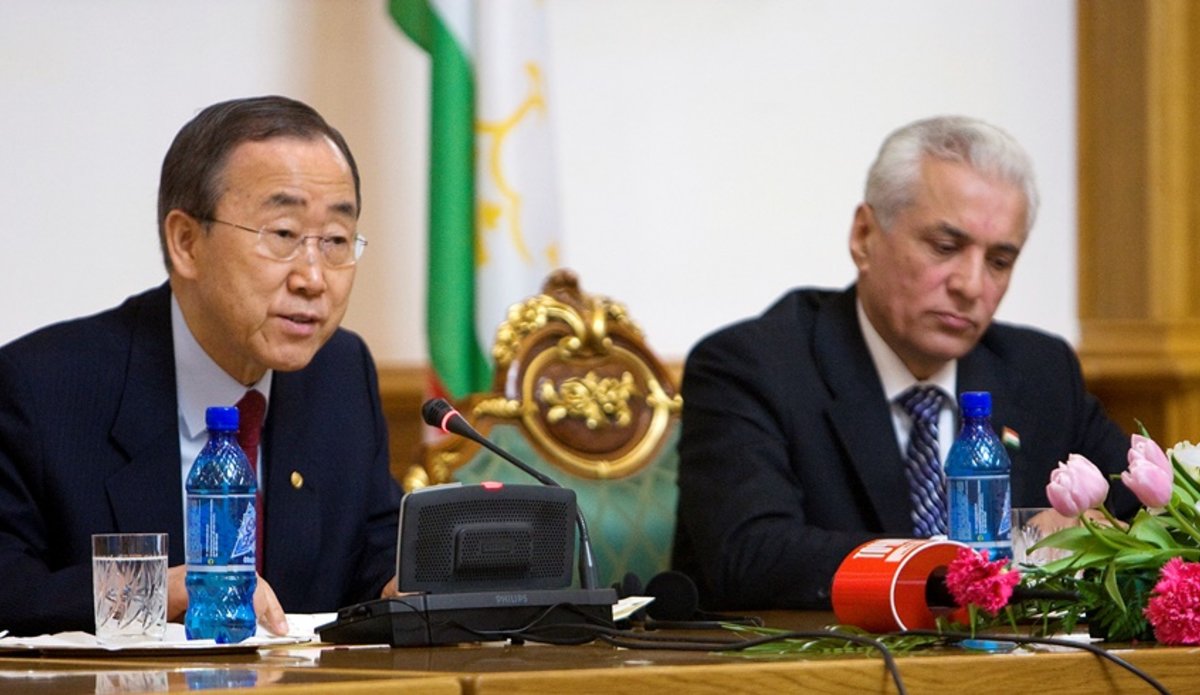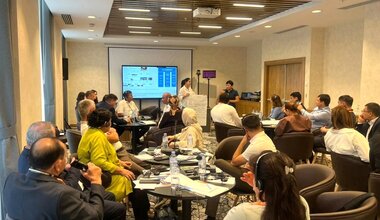UN Secretary-General's joint press conference with Hamrokhon Zarifi, Foreign Minister of Tajikistan
DUSHANBE, Tajikistan
(Secretary-General's remarks only)
SG: Good morning ladies and gentlemen. Before beginning, let me thank His Excellency President Rahmon and the Tajik Government and its people for the warm welcome in this beautiful country.
Yesterday afternoon and this morning, President Rahmon, Foreign Minister Zarifi and I held a series of very constructive discussions on a range of regional and global issues.
Our discussions focused, in particular, on a matter of pressing and crucial importance to all five nations in Central Asia. I refer, of course, to the management of natural resources, chiefly water and energy. The question is how to use common resources for common prosperity. That is why I am visiting Central Asia, before tensions grow worse. Whether it is oil and natural gas or water, this method should be used fairly and harmoniously, it is in the interest of neighbouring countries. This is a collective responsibility, both of the leaders of Central Asia and the international community.
In our discussions, we agreed that the UN Regional Centre for Preventive Diplomacy offers a key role. We need to sit down and resolve these issues in a harmonious way, to benefit all. In this regard, I asked the President, as I did other leaders, to appoint a permanent focal point to work with the UN in promoting regional dialogue. It is positive that the terms of reference of the World Bank's study of Rojhun have been agreed. The Government of Tajikistan has informed me that they not only agreed to the assessment, but that the World Bank personnel will arrive this month to keep the project under constant consideration. Therefore, all parties concerned should refrain from unilateral action until the World Bank has concluded its technical assessment of Tajikistan's proposed hydropower project.
I thanked President Rahmon and Foreign Minister Zarifi for their contribution in Afghanistan. I also thanked the Tajik Government for their participation in the United Nations peacekeeping forces, especially police officers. The Foreign Minister expressed his Government's willingness to dispatch more military and police forces, and I understand that these additional forces will need some training before they dispatch.
I emphasized that the United Nations stands ready to do whatever it can to assist the country's ambitious plans for social and economic development.
In our discussions concerning human rights, I encouraged the Government to further strengthen country's human rights and justice institutions, as well as to comply fully with international human rights laws and the many treaties to which it is a signatory.
To address the concerns of the international community, I urged the Government, in particular, to ratify the Optional Protocol to the Convention Against Torture and to cooperate with the [UN] Human Rights Council in Geneva, including its request that independent experts be allowed to visit Tajikistan.
I encouraged the Government, as well as Parliamentary leaders, to broaden their partnership with civil society. As in other countries, media freedom, tolerance for ethnic and religious diversity and a robust civil society are fundamental to modernization.
Finally, I am deeply concerned about what I heard of the potential crisis from the blockage of train shipments on the border, particularly, agricultural inputs in this planting season.
Thank you very much.
Q: [in Russian on the use of natural resources in Central Asia on mines and on the problems at the border for cargo shipments.]
SG: I had an in-depth discussion with President Rahmon and the Foreign Minister on this very crucial issue – how the countries in Central Asia can fully, fairly and harmoniously use natural resources – water, gas, all this energy. These are common resources for common interests and these should be used fairly, respecting and reflecting the interests of all the countries in the region. That is a basic principle. I do not think there is any disagreement on this point.
For this specific project of the Rojhun Dam [inaudible] as I said in my statement, the World Bank terms of reference of the study of this facility has been agreed by all parties and therefore it is necessary and important that these terms of reference should be implemented by the World Bank under the aegis of the United Nations, to have an independent and objective scientific assessment on seismology, hydrology and all other related issues.
I am encouraged to note that the leaders of both Tajikistan and Uzbekistan have told me, and assured me, that they will respect the final outcome of the technical assessment of the World Bank. Therefore, I have been urging all the parties concerned to refrain from taking any unilateral measures. That will help with restoring [inaudible] trust and confidence among the parties.
Q: [on anti-personnel mines.]
SG: Yesterday, I had the pleasure of meeting the anti-personnel mine officers, as well as seeing some photos of some mine victims. It was very sad, a totally unacceptable situation. So many innocent people have been victimized, their lives have been lost. Many people have been seriously injured. It was quite heartbreaking for me – very sad. The United Nations and UNDP all have been very active, participating in [inaudible] clearing the landmines. I am very much grateful to those members of the international community who are clearing landmines under such very dangerous circumstances. And the United Nations and all related Agencies have also been providing treatment, medical assistance and rehabilitation for the injured people. And we will continue to provide such support.
I have already stated my position. I am deeply concerned by this blockage of train shipments on the borders, particularly agricultural inputs. I know that, within two weeks' time, the planting season is coming. It is absolutely necessary that farmers should be able to have agricultural inputs - fertilizer, fuel, feed – all these should be imported without further delay. This is a humanitarian issue. This will create very serious negative consequences if farmers lose their planting season. Therefore, I am urging the parties concerned to allow these agricultural inputs to be freely imported without further delay.
 UN
UN





